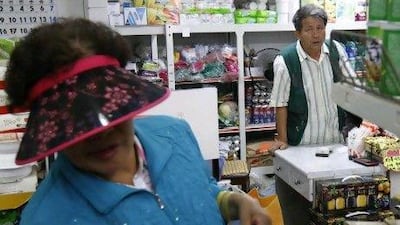SEOUL // In South Korea, where the average retirement age is a relatively young 58, the golden years are often filled with hard work in coffee shops and small stores that barely provide a living.
More than half of the country's 7.1 million baby boomers - born between 1955 and 1963 - had made no financial preparations for retirement, a survey conducted by the country's welfare ministry found. Many of them try to support themselves by opening small businesses on borrowed money.
The result is a surge of heavily indebted, self-employed seniors who are at risk of defaulting on debts that average US$60,400 (Dh 222,000) per household for those in their 50s.
It's an ominous sign for a country whose population is ageing faster than any other developed nation.
"So many people, once they retire or quit from their regular paying jobs have nowhere to go but to start up their own businesses," said Kim Sun-bin, a researcher at Samsung Economic Research Institute, a Seoul-based think tank.
People 50 and older represented 54 per cent of South Korea's self-employed last year, up from 47 per cent in 2008. Older people also carry the heaviest debt burden, approaching two times annual income for those over the age of 60.
The country of 50 million people has been dubbed "The Miracle on the River Han" for catapulting itself from the ruins of the Korean War into the world's 13th largest economy in just one generation.
Huge conglomerates such as Samsung and Hyundai, make cars and smartphones that sell globally.
But small businesses employ close to 30 per cent of the labour force, the fourth-largest proportion among countries in the Organisation for Economic Co-operation and Development. Of those, 27 per cent were either in debt or unable to turn profits in 2010, according to the Small and Medium Business Administration.
"We make just enough to eat and survive," said 61-year-old Lee Jin-taek who runs a general store with his wife.
With about 3.1 million baby boomers set to retire in the next 10 years, the government is mindful that the generation that helped build South Korea into Asia's fourth-largest economy risks being cast on to the scrapheap. So far, they have failed to come up with any concrete policies.
The average monthly payout for pensioners is less than US$260 and 72 per cent of citizens who are more than 65 years of age are not eligible for pensions because they did not pay into the relatively new system, set up in 1988, according to the National Pension Service.
"The baby boomer generation is one that has tirelessly run forward without time to look after themselves," President Lee Myung-bak said this month as the government sought an answer to the problem.
For all the good intentions, the government may struggle to pass laws with a hung parliament and politicians preoccupied with presidential elections in December.
The government wants to help baby boomers keep their jobs longer, provide information and seed money for start-ups, and open a school to teach entrepreneurs.
"We are still in the process of getting budgets approved for these policies," said Lee Ji-eun, a government officer and part of a taskforce set up by the labour ministry to handle the issue of manpower in an ageing society.
Political paralysis means the legislation, even if implemented, will come too late for many current retirees. It may eventually help those born between 1967 and 1973 who are expected to start to retire in a decade. An estimated 8.1 million are in this second wave of retirees.
In a country that prides itself on Confucian values of thrift and hard work, it is a paradox that debt is so high among older people.
People aged 50 or more accounted for nearly a quarter of applications for personal debt restructuring in 2011, up from 15 per cent in 2006.
Lim Hyun-jun, 30, barely speaks to his mother after she opened a noodle shop in Gangnam, one of Seoul's most prestigious neighbourhoods. The store closed a year ago, with losses of US$87,500.
"She blindly believed she could do it. I told her it was a stupid idea and to quit," said Mr Lim. "It was all gone in just a few months.

